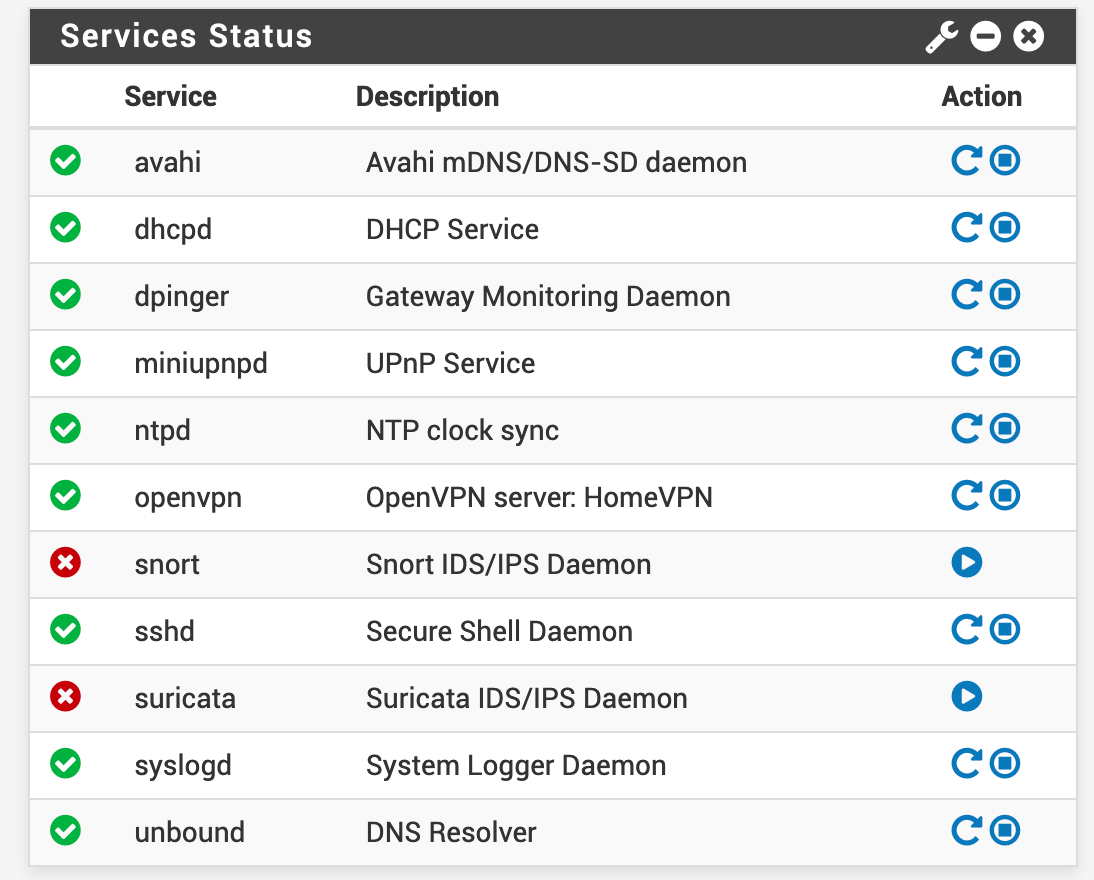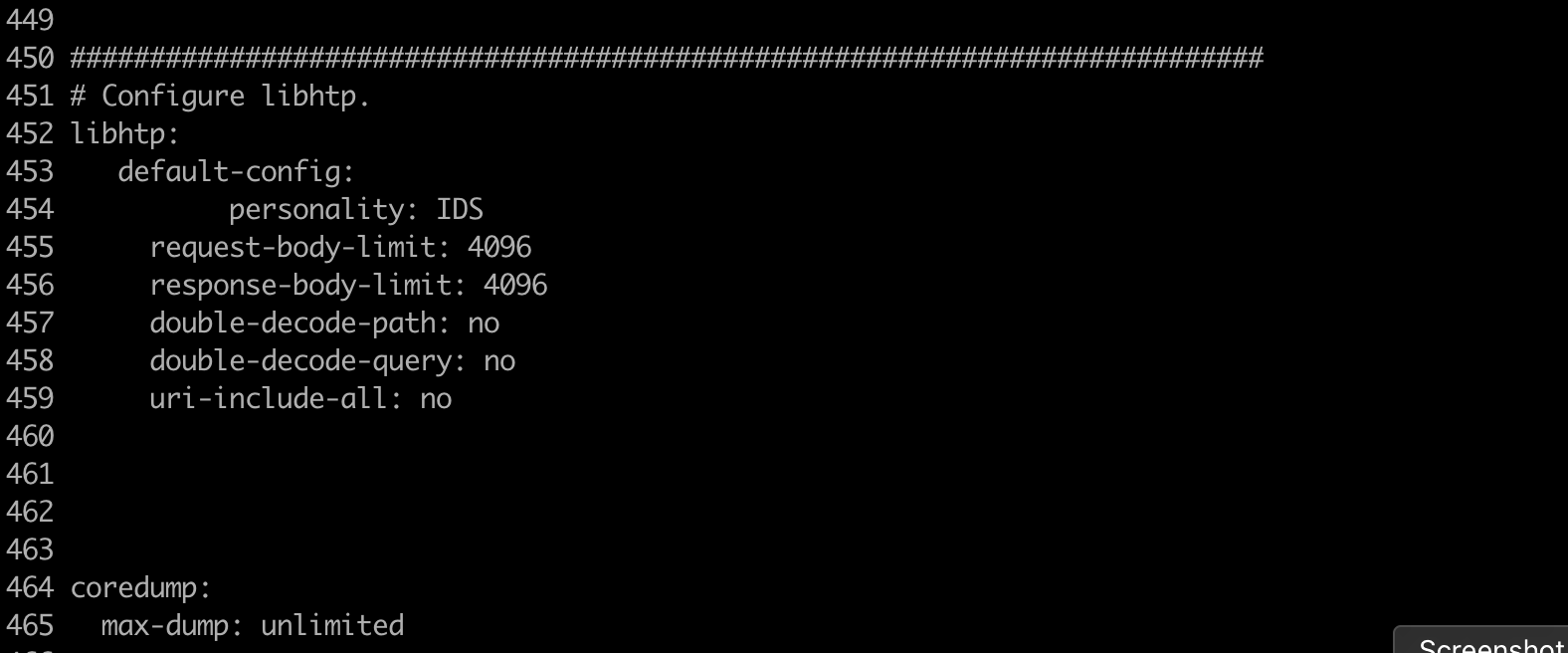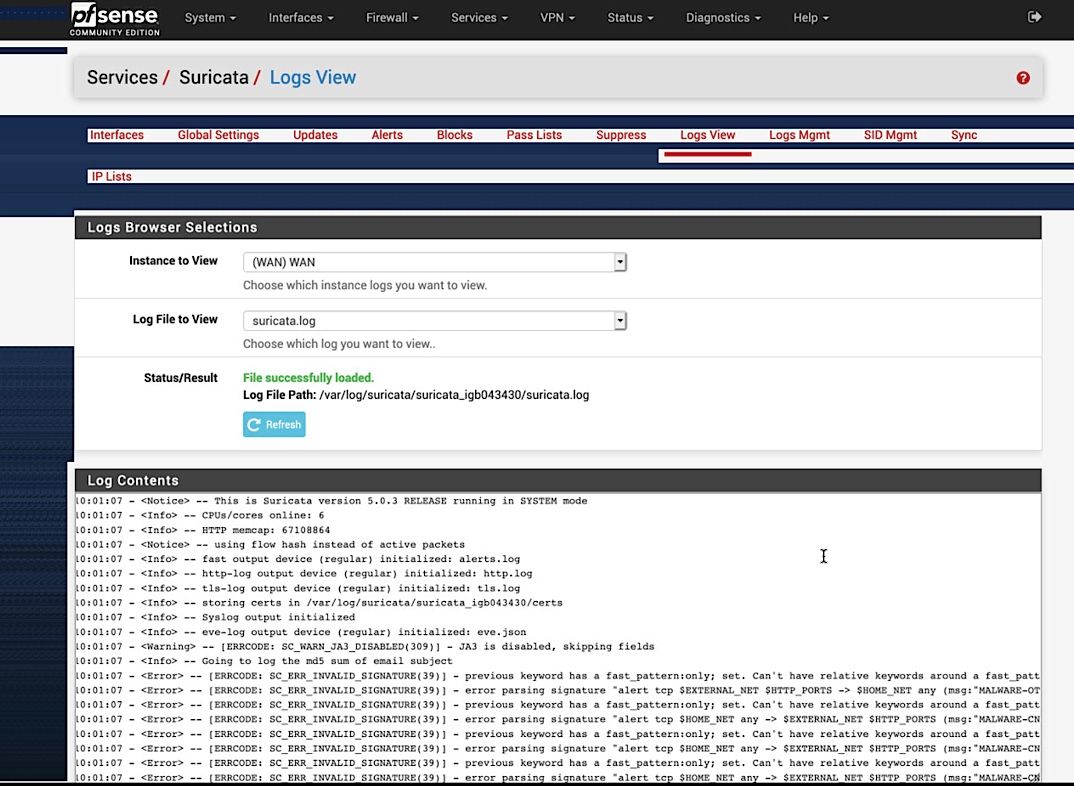Suricata Not Starting, Blank Log File (Resolved)
-
Not that I know of. These are the services I have running:

Should I try starting only from the command line?
-
Are you maybe trying to run Snort and Suricata on the same interface?
I'm really struggling to envision a situation where the Suricata binary will start and print out version information from the command line, but won't at least start populating the
suricata.logfile when you start it from the GUI.You are starting it from the INTERFACES tab in Suricata, correct? You aren't trying to start it from the SERVICES widget icon are you? You can't start Suricata from the SERVICES widget until you have at least configured everything and successfully saved settings on the INTERFACE SETTINGS tab.
-
I tried starting from both. The last couple of times only from the interfaces tab. I have Snort disabled.
-
At this point, I'm sorry to say I am out of ideas. I've never seen this problem before with the package. The problems with non-starting have always been either missing or incorrect versions of shared libraries or problems with TCP stream memcap limits being exceeded on multi-core CPUs. The former will show up as error messages when trying to run the suricata -V command from a shell prompt, and the latter will show up as errors in the
suricata.logfor the interface.One last thing you can try, just in case your browser has some plugin causing an issue with opening and viewing the text log, is to go to DIAGNOSTICS > EDIT and then browse to and open this file --
/var/log/suricata/suricata_igb0_xxxxx/suricata.logwhere the xxxxx is a random UUID number. See if you see the log file there and if it has anything in it. Another wild guess is perhaps the permissions in that directory are wrong (but that is really highly unlikely as Suricata runs as root).
One last thing that just hit my mind, is
/vara RAM disk? And if it is, do you have enough space allocated? -
I went to the file through the Diagnostics area, and it was in fact blank also. How do I check for RAM disk? This pfSense machine is it's own PC, doesn't share anything and is not virtualized if that's what you mean. When I SSH in to the machine, and go to the /var/log/suricata file, it tells me permission denied. A can get to the log directory, but not suricata directory, and it won't let me sudo as it says "sudo: command not found"... the permissions for the suricata directory appear to be 700, owner: root, group: wheel. I logged in as admin to the GUI, and I can now get to the file through SSH, but it is still empty.
-
@5cub4f1y said in Suricata Not Starting, Blank Log File:
I went to the file through the Diagnostics area, and it was in fact blank also. How do I check for RAM disk? This pfSense machine is it's own PC, doesn't share anything and is not virtualized if that's what you mean. When I SSH in to the machine, and go to the /var/log/suricata file, it tells me permission denied. A can get to the log directory, but not suricata directory, and it won't let me sudo as it says "sudo: command not found"... the permissions for the suricata directory appear to be 700, owner: root, group: wheel. I logged in as admin to the GUI, and I can now get to the file through SSH, but it is still empty.
Since I do not know your skill level with Unix type systems, I need you to get very specific with exactly which file you tried to view. Saying
/var/log/suricatais not descriptive enough. That is the root-level logging directory for all Suricata instances that you may configure. It is not a file. Each interface has its own private sub-directory underneath/var/log/suricatawhere it writes interface-specific logs. So please give me the entire pathname and then final filename of the file you tried to view the contents of.As I said in an earlier post, I really can't envision a failure where Suricata will start and print out version information from the command line, but then fail to start from the GUI and also fail to log a single thing to its
suricata.logfile.I am the programmer who created the package, so I am extremely familiar with how it works ...
 .
. -
The path to the log file was /var/log/suricata/suricata_igb043430/suricata.log
And thanks for taking the time to help with this. Is there a chance I may have misconfigured something? The “Log Facility” when in the Edit Interface Settings/WAN is set to LOCAL1, this is one thing I am not sure about.
-
@5cub4f1y said in Suricata Not Starting, Blank Log File:
The path to the log file was /var/log/suricata/suricata_igb043430/suricata.log
And thanks for taking the time to help with this. Is there a chance I may have misconfigured something? The “Log Facility” when in the Edit Interface Settings/WAN is set to LOCAL1, this is one thing I am not sure about.
No, that Log Facility setting should have no bearing on writing the
suricata.logfile. That setting just determines how Suricata logs alerts to syslog (when enabled). All of the startup and other diagnostic information is always written to thesuricata.logregardless of any other settings.It is apparent that Suricata is not starting since the log file is empty and the GUI shows the red X. Why it is not starting is the big mystery. I assume you have done at least a minimal configuration by selecting an interface, enabling the download of some rules and then configured some rules on the CATEGORIES tab (or else used the SID MGMT tab features to enabled rules). And that you clicked Save each time after doing these things.
So examining your pfSense system log after attempting a Suricata start, do you see any messages saying Suricate exited on Signal 11, or Signal 10 or anything else like that?
You can try this command sequence to launch the binary and test the
suricata.yamlconfiguration from a shell prompt on the firewall --cd /usr/local/etc/suricata/suricata_43430_igb0 /usr/local/bin/suricata -T -c ./suricata.yamlSo the first line simply changes the directory to the local interface sub-directory for your WAN. The second line executes the Suricata binary and tells it to test the
suricata.yamlfile for errors.Run that sequence and see what you get. Report back here.
-
Now we may be getting somewhere.

-
@5cub4f1y said in Suricata Not Starting, Blank Log File:
Now we may be getting somewhere.

Yep, there is an error in that file on line 454. The file format is very picky about indentations and other issues. However, if you have an error in that file it would actually indicate something entered incorrectly in the GUI boxes. That's because what you enter into the GUI boxes is used to create the
suricata.yamlfile on-the-fly when you click Start. So if you look at that line number in the file, you can get a clue about what may be wrong on the GUI side. -
Here is the line number in when I 'cat' the file. Indentation issue?

-
Yes, I think it is an indentation issue. YAML files are very picky about that, and so is the parser inside the Suricata binary.
Try this edit and see what effect it has. Post back with the results.
-
Use either a shell text editor or the DIAGNOSTICS > EDIT command in the pfSense menu to open this file --
/usr/local/pkg/suricata/suricata_yaml_template.inc. -
Scroll down to near the bottom of that file to line 394. That area of code looks like this:
########################################################################### # Configure libhtp. libhtp: default-config: {$http_hosts_default_policy} {$http_hosts_policy}This is line 394:
{$http_hosts_default_policy}Delete the leading spaces in that line such it backs up flush to the left-hand margin. Save the change. Then go to the GUI and edit the Suricata WAN interface. Just click the edit icon to open INTERFACE SETTINGS and then click Save. That will regenerate the
suricata.yamlfile. Now attempt to start Suricata on the interface. -
-
That did it! It starts...

...and the log file is working... though there is a bunch of errors but I think that may have to do with Suricata rules?

-
Great! Thanks for patiently providing troubleshooting data and feedback. This looks like an error in the PHP code. It escaped my testing. Most likely because my favorite testing VMs for new versions already have an install of Suricata, so not starting from an empty slate each time. I will have to make it a point in the future to always test a green-field install as well as an upgrade.
There is a new Suricata binary release scheduled for October 8th from upstream. A few days after it is released, I will be updating the Suricata package on pfSense. I will include the fix for this bug in that update. Until then you are fine to run with the manual edit you made. When you update, a "fixed" file will get installed automatically. The actual fix will be inside another PHP file as that's where the typo originates. The file I had you modify is an easier temp workaround.
Lastly, those rule errors are expected if you are running some Snort rules. Suricata does not recognize all of the Snort rule options and keywords. It will just skip loading those rules.
-
Excellent! Thank you for your patience. Is there anyway to mark this thread as resolved or does this forum not work that way?
-
@5cub4f1y said in Suricata Not Starting, Blank Log File:
Excellent! Thank you for your patience. Is there anyway to mark this thread as resolved or does this forum not work that way?
Sure, you can edit your original post and change the thread title to include "Resolved" if you would like. Just go to the post and click the little three-dots icon to the right of the Reply and Quote options. Then choose Edit in the flyout menu.
-
It won't let me edit any post older than 3600 seconds. Oh well. Anyone viewing this will obviously be able to tell its resolved anyway, and working like a charm. :)
-
@5cub4f1y said in Suricata Not Starting, Blank Log File:
It won't let me edit any post older than 3600 seconds. Oh well. Anyone viewing this will obviously be able to tell its resolved anyway, and working like a charm. :)
Let me see if it will let me change it. I am supposedly a moderator for this sub-forum.
Edit: Yep, let me do it.